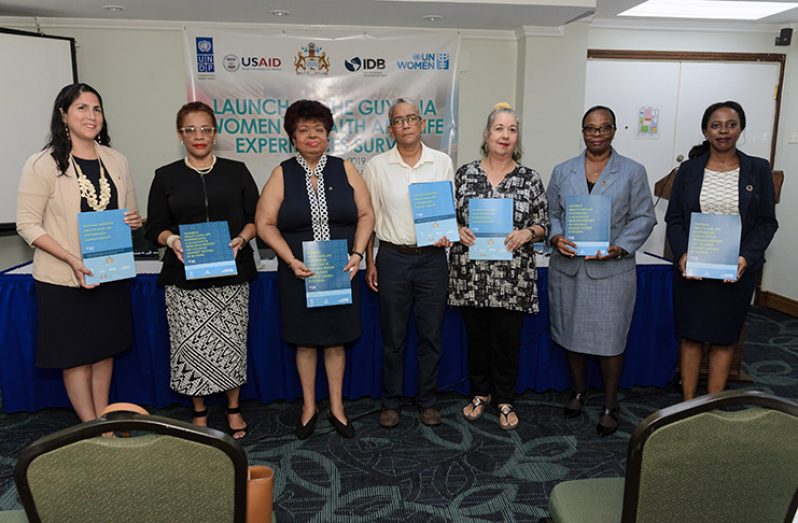– Guyana Women’s Health and Life Experiences Survey Report found
By Tamica Garnett
More than one in three Guyanese women experience intimate partner violence (IPV) and some 20 per cent of women in Guyana have experienced non-partner sexual abuse (NPSV) in their lifetime.
Around 13 per cent experience the latter form of abuse before the age of 18, the Guyana Women’s Health and Life Experiences Survey Report noted.
The two-part report launched on Wednesday also included a qualitative component: “Women’s Health and Life Experiences: A Qualitative Research Report on Violence Against Women In Guyana”.
The survey was executed as a collaborative project between the government, the UNDP and UN Women; USAID, Inter Development Bank (IDB), the University of Guyana, the Global Women’s Institute of George Washington University, and the Canadian Institute of Health Research.
The report provides an in-depth analysis of the present state of violence against women and girls in Guyana and look at the social structures that contribute to the issue.
The initiative represents the first of national-level prevalence data on violence against women and girls (VAWG) being collected in Guyana, and is seen as an essential tool as Guyana strives towards a national plan to tackling domestic and gender-based violence countrywide.
“It is a crucial and long overdue report on violence against our women and girls in Guyana. This report marks a huge advancement for women’s health and rights for the first time,” commented Minister of Social Protection, Amna Ally, as she delivered the key address at the launch.
SAD SITUATION
“Many Guyanese women and children are suffering physical and mental hurt within their homes through verbal abuse, threats, harassment, bully and violence. Yet too often fear and misplaced shame are preventing those victims from breaking the silence on which these forms of violence thrives. All of us owe it to the women who suffer from domestic violence and the women to step up, speak out and end domestic violence now.”
Patriarchal norms in which the social status of men and boys is higher than that of women and girls, is said to be a primary contributing factor to VAWG.
Minister Ally pledged that the recommendations coming out of the study will be looked at and means of implementation of recommendations initiated, including a multi-sector collaborations.
“This report proves that there is a clear need to improve efforts across a range of sectors both to prevent violence and to provide necessary services for women experiencing violence. It is my hope that this report will serve as a unified call to action for all working towards building nation without violence against women and girls. Government remains committed to addressing root causes of gender inequality to empower women now and in the future. Enabling them to have a voice, choice and control over their own lives,” Ally said.
She added: “It may appear to be too ambitious to think we can reduce domestic violence to zero but we should set that as our aim regardless. Right now we can and should reduce domestic violence from where it is and as much as it is realistically possible.”
The report was created following a household survey interviewing some 1498 women across the country, between the ages of 15 – 64 years old; while the qualitative report involved 24 key stakeholder interviews and 13 focus group discussions involving 153 male and female adult participants.
The report found that all it takes for a female in Guyana to be at risk of sexual violence is for her to be young, with Guyanese women between 15 – 24 reporting statistically higher rates of NPSV, including rape, attempted rape, unwanted sexual touching and sexual harassment.
Approximately 55 per cent of the surveyed respondents, who had ever had a male partner, have experience some form of IPV during their lifetime.
ACTION NEEDED
“These findings present an urgent and compelling call for action. All forms of violence described are a serious cause for concern. Some are intergeneration violence,” commented Alison McLean, representative from the UN Women Multi-Country Office-Caribbean, who also delivered remarks at the event.
The survey found that women who begin their first relationship at a young age, lack of family support or have a controlling partner, have higher risks of experiencing physical and or sexual IPV.
Few women report NPSV to the police or to a health care provider, and among those who did, their experiences were inconsistent. For those who did seek help the results are not encouraging.
Less than half said that a case was opened in response to their police report, one in five leave the police without a report being taken, for the women who report the abuse to health care providers, fewer than one in 10 receive counselling, the survey found.
The harms of IPV can span generations, the report said.
“Women who witnessed violence against their mothers in childhood or have a partner who witnessed such violence are at significantly higher risk of experiencing IPV, continuing the cycle of exposure and IPV through their children,” the reports noted.
The victims themselves, community members and stakeholders, all contribute to Guyana women’s reluctance to seeking help,” the survey found.
Other factors it said include inadequate support structures to ensure victim safety; inconsistent and harmful institutional responses; and a lack of coordination between sectors.
The report calls for programmes that focus on changing patriarchal cultural norms and gender attitudes, including through educational initiatives in primary, secondary, technical, vocational education and training and tertiary level educational institutions.



.jpg)









